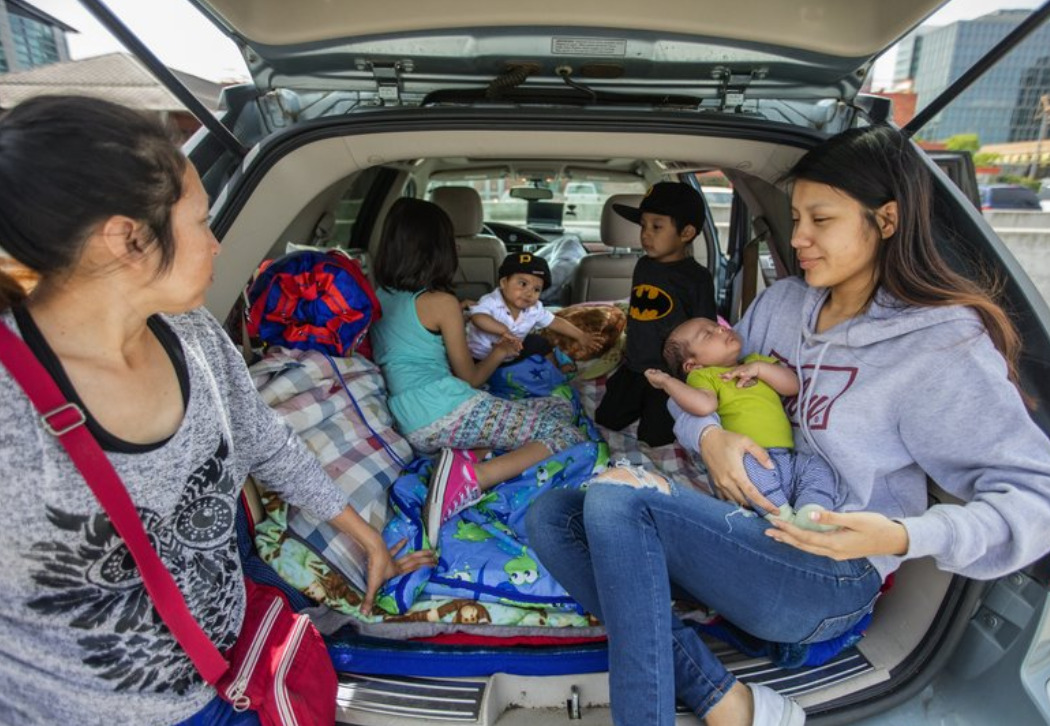By Dash Finley
New figures released by the US Department of Housing and Urban Development have found that upwards of 9,000 newly homeless individuals in Los Angeles are now living out of their vehicles – up 600 from last year. The shocking rise in car-domiciles is attributed to skyrocketing rents throughout the area, which has caused the price of living to far outpace average wages. After the housing crash in 2008, real estate prices plummeted in LA, allowing cash-flush investment firms to begin buying up cheap properties. The county has little in the way of protective measures in place for residents, lending landlords overarching freedom in regard to what they are allowed to do with their properties. Recently, as the economy began to boom, property owners have manipulated the law so as to vacate buildings and dramatically hike up the price of rentals.
The stories of car-bound homeless people often follow a familiar pattern: typically, these men and women were working a steady job, when a sudden rent increase left them scrambling to scrounge up additional finances. Unable to cover the difference, they were forced to face a wrenching choice: either opt for life on the street, or find an alternative, cheaper space to live in. These people come from all walks of life; recent interviews conducted for local news services have cited social workers, television cameramen, and, in Kevin Recinos’ case, a life skills coordinator who helped the homeless, only to end up in that very position himself. Said Recinos in an interview with CBS News: “I realize this is the first time I’ve ever walked anyone through (living in my car). It’s kind of really vulnerable. It’s like I’m showing you my bedroom, and it sucks.”
Despite the tragic prevalence of this lifestyle, it remains illegal in Los Angeles county to sleep in one’s car overnight, so these vulnerable denizens must go incognito, attempting to blend into the neighborhood where their mobile living spaces are parked out of fear of being rousted or hit with heavy tickets. Nevertheless, efforts have been made in the community to accommodate this trend, including organizations like Safe Parking LA – a non-profit that was founded in 2016 and provides securely guarded parking lots for homeless people’s cars, hosting up to forty-five vehicles a night. Additionally, for those with access to the Internet, bustling online communities such as the Digital Nomads Forum, Sprinter Source, and TheSamba.com provide people living in cars with repair tips, inspiration, and practical support. Lastly, and most significantly, the Los Angeles County Board of Supervisors signaled its intent to greatly expand eligibility for relief benefits to those whose primary residence is a vehicle. The present code tops off the value allotted to such individuals at $4,500, while DPSS will raise that figure to $11,500 yearly, thus providing some much needed financial cushioning to those struggling with this burgeoning form of homelessness.
Elsewhere in Southern California, the signs of progress have become even more evident. In February, the San Diego City Council repealed an ordinance which barred overnight stays in parked cars, ignoring the vehement complains of some local residents. In a piece from bakersfield.com, San Diego resident Lola Cheathman – a young mother of four – spoke of having to overcome trials-by-fire while living out of her Volvo station wagon: “I had to have some semblance of normalcy for my kids… Once our registration was expired (though), and I got two or three tickets a week.”[2] Were it not for the recent ruling, the cost of those tickets would have led to her vehicle being impounded, which would likely end with Cheathman and her children living on the streets. Despite positive steps elsewhere, Los Angeles’ homelessness problem remains an epidemic, with 2018 data recording 3,814 people living in cars, 3,554 people in vans and 8,380 in RVs and Campers. Russ Heimerich, deputy secretary of communications for California’s Business, Consumer Services and Housing Agency, says direct action is needed in order to make a difference, stating: “one of the major causes of homelessness is, frankly, the high cost of housing in California, and so we… work on initiatives to get local governments to approve and plan for housing and make it easier to plan for developers who want to build housing to do so.”





